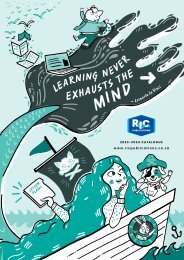RIC-20800_Teaching_Strategies_for_Writing_BkD_punctuation
Create successful ePaper yourself
Turn your PDF publications into a flip-book with our unique Google optimized e-Paper software.
TEACHER INFORMATION<br />
USING PUNCTUATION IN<br />
SENTENCES<br />
UNIT 9<br />
Focus<br />
Punctuation – using <strong>punctuation</strong> in sentences<br />
Progression<br />
Recognise<br />
Students will recognise specified <strong>punctuation</strong> from modelled<br />
examples.<br />
Choose<br />
Students will choose appropriate <strong>punctuation</strong> <strong>for</strong> sentences, with<br />
teacher support.<br />
Use<br />
Students will correctly punctuate supplied and self-written<br />
sentences.<br />
Definition of terms<br />
A sentence is a set of words that makes sense by itself. It may be<br />
a statement, a question, an exclamation or a command.<br />
Capital letters are used at the beginning of a new sentence and<br />
<strong>for</strong> proper nouns.<br />
Proper nouns are nouns used <strong>for</strong> naming a particular person,<br />
place or thing.<br />
A full stop is used at the end of a sentence.<br />
A question mark is used at the end of a question.<br />
An exclamation mark is used at the end of an exclamation.<br />
Introduction<br />
Good writers improve their writing by using correct <strong>punctuation</strong>.<br />
Teacher in<strong>for</strong>mation<br />
Punctuation enables a writer to more fully and accurately<br />
communicate with the reader by making the writing more<br />
understandable.<br />
LESSON NOTES AND PLANS<br />
Introduction<br />
• Read a teacher-selected short passage to the class, ignoring the<br />
<strong>punctuation</strong> and exaggerating the effects.<br />
• Ask students if they had difficulty understanding the passage.<br />
• Elicit from students the reason(s) why it was hard to understand.<br />
• Question how <strong>punctuation</strong> makes text easier to understand. List<br />
student responses and discuss.<br />
Punctuation: do we need it? – Page 60<br />
• Read the text piece with the class.<br />
• Set students to work in pairs to complete Question 1.<br />
• In small groups, discuss their answers. How similar were they? Why?<br />
• Work with those requiring additional assistance while the remainder<br />
of the class work independently on the activities.<br />
Capital letters – Page 61<br />
• Read and discuss the text.<br />
• Ask ‘What is missing?’ and list answers.<br />
• Question students to obtain a clear definition of what full stops and<br />
proper nouns are.<br />
• Emphasise that a capital is needed <strong>for</strong> proper nouns; <strong>for</strong> example,<br />
South Lake, Wellstead River, Washington, DC.<br />
• Explain that mum and dad only need a capital letter when used<br />
instead of their names; <strong>for</strong> example, My mum and dad love boating –<br />
I asked Dad if we could stay longer on the river.<br />
• Work with those requiring additional assistance while the remainder<br />
of the class work independently on the activities.<br />
• Encourage students, in small groups or as a class, to discuss their<br />
responses to Question 4 (b) and (c).<br />
Short sentences – Page 62<br />
• Read the text at the top of the page.<br />
• Ensure students are familiar with the features of a sentence, a<br />
command, an exclamation and a question, including their specific<br />
<strong>punctuation</strong>.<br />
• Provide opportunities <strong>for</strong> students to discuss in pairs their answers<br />
to Question 3.<br />
Is it correct? – Page 63<br />
• Revise with students the <strong>punctuation</strong> required <strong>for</strong> beginning and<br />
ending a sentence, proper nouns, questions, exclamations and<br />
commands.<br />
• Work with those requiring additional assistance while the remainder<br />
of the class work independently on the activities.<br />
58<br />
TEACHING STRATEGIES FOR WRITING (Book D)<br />
www.ricpublications.com.au


















